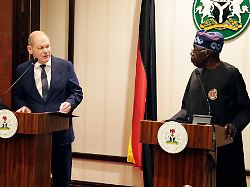The Greens speak of a scandal
Scholz hopes for hydrogen and gas from Nigeria
October 30, 2023, 3:37 p.m
On the way to becoming a climate-neutral economy, the federal government is increasingly relying on hydrogen. Germany is setting up its own office for this in Nigeria. But gas will also be imported from there. Green energy politician Badum is outraged.
Chancellor Olaf Scholz sees Nigeria as a possible hydrogen supplier for Germany. “You are well positioned to remain a key player for renewable energy and hydrogen – as well as for liquefied natural gas, which we will continue to need in the coming years until the hydrogen market is fully established,” Scholz said at a German-Nigerian economic forum in Lagos.
Scholz had already confirmed his interest in Nigerian gas during his talks with President Bola Ahmed Tinubu on Sunday. Green energy politician Lisa Badum has now sharply criticized Scholz’s statements about the development of large gas reserves in Nigeria. “It is a scandal and against our international obligations that Scholz is asking companies and states to increase their fossil investments in the global south,” said the chairwoman of the Greens in the Bundestag’s climate and energy committee. “We can’t actually afford a climate chancellor who takes action when it comes to new fossil sources, but sits on his hands when it comes to switching from dirty natural gas to renewable energies.”
At the economic forum, Scholz particularly emphasized the possible cooperation on hydrogen. “We are creating one of the world’s first markets for hydrogen as an energy source for our economy.” Some of this hydrogen can be produced in Germany, but most of it will have to be imported. “This is where countries like Nigeria come into play,” he added. The German-Nigerian partnership in the area of energy and climate, which was launched in 2008, was therefore expanded. Germany has also set up a hydrogen office in Nigeria.
Africa’s largest economy
The background is that Germany will need more and more hydrogen imports in the coming years to achieve its goal of a climate-neutral economy. That’s why the search for possible suppliers is a topic on almost all of the Chancellor’s and Economics Minister Robert Habeck’s trips.
Nigeria is Africa’s most populous country and largest economy. However, according to Scholz, trade with Germany can still be significantly expanded at around three billion euros in 2022. There are ninety German companies in Nigeria that have 17,000 employees, he said. However, German investments in Nigeria in 2021 only amounted to 150 million euros.
Scholz had called on German companies to expand their supply chains and not become too dependent on business with China. He emphasized that Germany supports the efforts of African countries to process raw materials in the country themselves.
